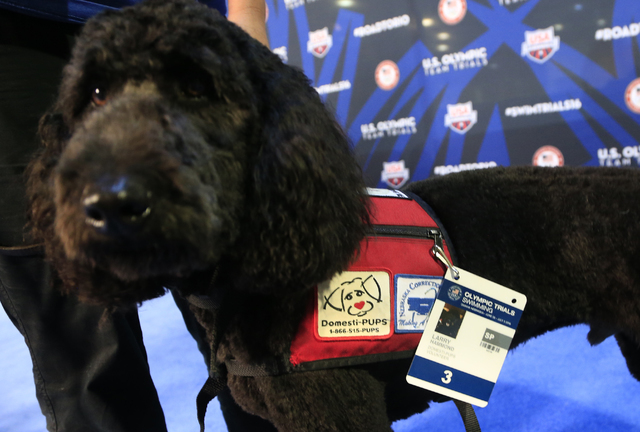US swimmers have therapy dogs at the Olympic trials to stay calm before meets

OMAHA, Neb. — Kacey Oberlander is missing her dogs back home, and she’s more than a little stressed competing in the high-pressure environment at the U.S. Olympic swimming trials.
That’s where Holly comes in.
The adorable, 4-year-old Havanese is available for petting and furry hugs.
“It just calms me down a lot,” said Oberlander, who swims for York YMCA in Pennsylvania and will be attending the University of Alabama in the fall. “It’s nice to see the happy puppy dogs running around when everything is so intense and everyone’s so serious. The dogs are very happy all the time. It makes me calm.”
Yep, these Olympic trials have gone to the dogs — and the athletes are loving it.
USA Swimming, in an effort to ease some of the anxiety accompanying such a major meet, has partnered with Domesti-PUPS — a nonprofit organization based in Lincoln, Nebraska, that is providing four-legged companions for the athletes lounge at CenturyLink Center.
In a section of the arena that is generally off-limits to everyone except the swimmers, dogs such as Holly and Larry, a Goldendoodle who will readily pose for a picture or pause for a pat on the head, have been welcomed with open arms.
If anyone doubts their purpose, each pooch wears a collar that says, “Please ask to pet me. I’m friendly.”
“There’s a lot of pressure,” said Leah Braswell, a teammate of Oberlander’s. “Having the dogs here is a great distraction, a way to take a break from all of that. They’re happy all the time. It just makes you happier. You can forget about whatever race you just had.”
Given their gentle, soothing nature, “therapy dogs” have become more and more familiar around hospitals, retirement homes, hospice centers and disaster areas. They’ve provided comfort to veterans and those suffering from autism. They’ve even done time in prisons, nudging inmates along the road to rehabilitation.
There’s no judgment from these animals. Fido merely wants to love and be loved. For someone in pain or anguish, they can be an invaluable companion.
At the Olympic trials, their role is a bit different.
But it’s really in keeping with the extensive training that Domesti-PUPS puts its animals through before sending them out into the world.
“Anywhere there’s an elevated level of stress, we can take our dogs and try to de-stress them,” said Sandy Ludwig, who works with the organization. “These dogs are just lying there, waiting to have their bellies rubbed or their ears scratched.”
That’s what Morgan Weinberg had in mind for the trials, an all-or-nothing meet that not only determines the powerful American team for the Rio Games, but also serves as a chance for many up-and-coming athletes to get their taste of a big-league atmosphere.
There are more than 1,700 swimmers in Omaha, most of whom have no chance of qualifying for the Olympics.
Yet the burden of competing weighs on all of them to some degree.
“This is the first time we’ve ever done it,” said Weinberg, the program and services manager for USA Swimming. “I’m an animal lover myself, and I was trying to think of different ways in the athlete lounge that they would calm down and kind of just relax and have fun. I like dogs, I thought about dogs, and it just kind of evolved into therapy dogs.”
She got in touch with Domesti-PUPS, which is providing about 30 dogs for all but the final night of the eight-day meet, which runs through Sunday.
Four dogs at a time work in three-hour shifts — some rotating through during the morning preliminaries, others stopping by for the evening finals. They even have their own security credentials, complete with a photo.
On the very first night of the trials, Ludwig knew she was on to something when a swimmer spent 20 minutes petting one of her pups.
“About an hour later, she came back and said, ‘That was a best swim I ever had,’” Ludwig recalled. “She said, ‘I was so relaxed when I went and jumped in the pool.’”
That’s not all. Many swimmers are missing their own dogs, the ones they had to leave at home, so they’re eager to just roll around on the floor with a canine they can at least temporarily call their own.
Oberlander is one of those going through pet withdrawal.
She has a pair of miniature dachshunds, Biscuit and Bella.
“I miss them soooo much,” Oberlander said. “When I come in here and see the dogs, it’s just like home.”
There’s one Labradoodle in particular who caught her eye — and her heart.
“He’s very fluffy. I like him the best,” she said, breaking into a big grin. “It’s like bringing a piece of Pennsylvania here to Nebraska with me.”